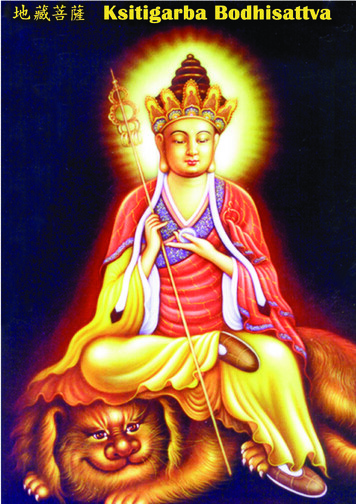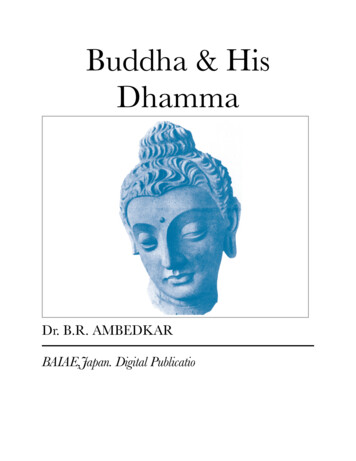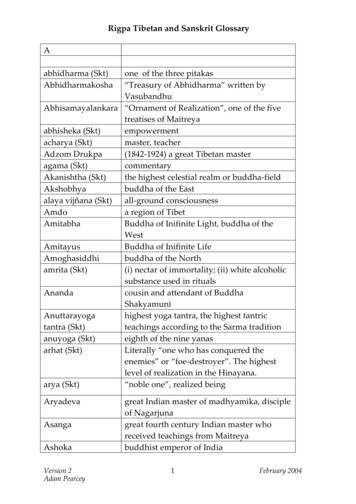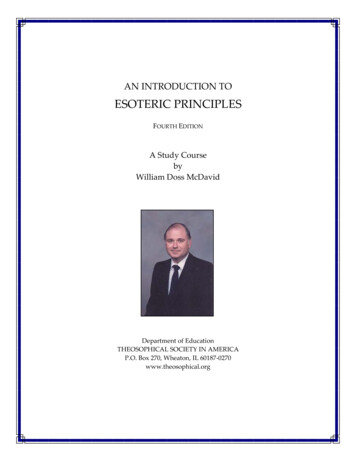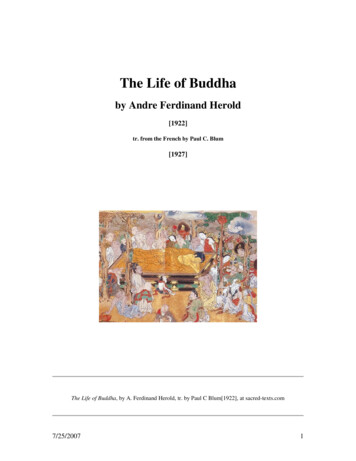
Transcription
The Life of Buddhaby Andre Ferdinand Herold[1922]tr. from the French by Paul C. Blum[1927]The Life of Buddha, by A. Ferdinand Herold, tr. by Paul C Blum[1922], at sacred-texts.com7/25/20071
THE LIFEofBUDDHAAccording to the Legends of Ancient IndiaByA. FERDINAND HEROLDTranslated from the French byPAUL C. BLUMDecorations by Mac HershbergerOriginal Title: La Vie du Bouddha, by André Ferdinand Hérold, Paris, Édition d’Art, H. Piazza [1922],Translation by Paul C. Bloom, New York, A. & C. Boni, [1927]. The copyright on the translation was notrenewed.Scanned at sacred-texts.com, March 2007. Proofed and Formatted by John Bruno Hare. This text is in thepublic domain in the United States because the original book it was translated prior to January 1st, 1923,and the copyright on the translation was not renewed in a timely fashion as required by law at the time.These files may be used for any non-commercial purpose provided this notice of attribution is left intact inall copies.7/25/20072
FOREWORDThis Life of Buddha is not a work of fiction, and I think it would be well to mention thebooks, both ancient and modern, which I have most frequently consulted.I have, for the most part, relied upon the LALITA-VISTARA. This book is a jumbledcollection of legends and scholastic dissertations, and yet in these pages are preservedmany precious traditions regarding the Buddha's origin, his childhood and his youth, andhere, likewise, we are told of his early education and of his first deeds.I have also made great use of an excellent poem, the BUDDHACARITA of Asvaghosa. Ina few of the chapters I have repeated the lines almost word for word. The text of theBUDDHACARITA was edited by E. B. Cowell.In the Life, I have interpolated several JATAKAS. These are stories in which the Buddharecalls his former lives. Some of them will be found in a vast collection, theAVADANASATAKA.Two modern books: LE BOUDDHA, by H. Oldenberg, translated by A. Foucher, and theHISTOIRE DU BOUDDHISME DANS L’INDE, by H. Kern, translated by Gédéon Huet,have also been very useful to me; as well as other works that have appeared in scientificreviews. Thus, for the touching story of Visvantara, I am indebted to a sogdian versionpublished by R. Gauthiot in the JOURNAL ASIATIQUE.Finally, I would be guilty of the deepest ingratitude if I did not publicly thank my oldfriend Sylvain Lévi for his generous and kindly advice.And may the reader find of interest this marvellous story of Prince Siddhartha who,through meditation, was able to attain supreme wisdom.A. F. HEROLD7/25/20073
TABLE OF CONTENTSPART 5.16.17.18.19.20.PAGEKING SUDDHODANA AND QUEEN MAYAMAYA'S DREAMTHE BIRTH OF SIDDHARTHAASITA'S PREDICTIONSIDDHARTHA AT THE TEMPLESIDDHARTHA'S FIRST MEDITATIONTHE MARRIAGE OF SIDDHARTHASIDDHARTHA LEADS A LIFE OF PLEASURETHE THREE ENCOUNTERSGOPA'S DREAMSIDDHARTHA IS EAGER TO KNOW THE GREAT TRUTHSSIDDHARTHA LEAVES HIS FATHER'S PALACESIDDHARTHA THE HERMITGOPA AND SUDDHODANA GRIEVETHE DOCTRINE OF ARATA KALAMASIDDHARTHA AND KING VIMBASARASIDDHARTHA DESERTED BY HIS FIRST DISCIPLESSIDDHARTHA UNDER THE TREE OF KNOWLEDGEMARA'S DEFEATSIDDHARTHA BECOMES THE BUDDHA69101214161824253032353639414244464953PART TRAPUSHA AND BHALLIKATHE BUDDHA IS PREPARED TO PREACH THE DOCTRINETHE BUDDHA LEAVES FOR BENARESTHE BUDDHA FINDS HIS FORMER DISCIPLESTHE STORY OF THE HERMIT AND THE HARETHE STORY OF PADMAKATHE BUDDHA AT THE BAMBOO GROVESARIPUTRA AND MAUDGALYAYANATHE BUDDHA PACIFIES THE MALCONTENTS OF RAJAGRIHASUDDHODANA SENDS MESSENGERS TO HIS SON555961636669727577784
11.12.13.14.15.16.17.18.19.20.THE STORY OF THE CRANE AND THE FISHTHE STORY OF VISVANTARATHE STORY OF DHARMAPALAGOPA'S GREAT VIRTUENANDA RENOUNCES ROYALTYTHE BUDDHA LEAVES KAPILAVASTUANATHAPINDIKA'S OFFERINGTHE NEW DISCIPLESNANDA'S PRIDETHE DEATH OF SUDDHODANA80839092939597100102105PART .15.16.17.18.7/25/2007PAGEMAHAPRAJAPATI IS ADMITTED TO THE COMMUNITYTHE BUDDHA EXPOSES THE IMPOSTERSSUPRABHAVIRUPASINCA'S DECEITTHE BUDDHA TAMES A WILD BUFFALODISSENSION AMONG THE MONKSKUVALAYA THE DANCERTHE GOD ALAVAKA DEFEATED BY THE BUDDHADEVADATTA EXPELLED FROM THE COMMUNITYAJATASATRU'S TREACHERYTHE DEATH OF DEVADATTAPRASENAJIT AND AJATASATRUTHE BUDDHA TEACHES THE DOCTRINETHE BUDDHA AND THE SHEPHERDTHE BUDDHA INSTRUCTS THE MONKS OF VAISALITHE MEAL AT CUNDA'STHE BUDDHA ENTERS 401431441455
PART ONE1. King Suddhodana And Queen MayaSERENE and magnificent was this city where once had dwelt the greathermit Kapila. It seemed to be built out of some fragment of the sky: thewalls were like clouds of light, and the houses and gardens radiated adivine splendor. Precious stones glistened everywhere. Within its gatesdarkness was as little known as poverty. At night, when silvermoonbeams fingered each turret, the city was like a pond of lilies; byday, when the terraces were bathed in golden sunshine, the city was likea river of lotuses.7/25/20076
King Suddhodana reigned in Kapilavastu; he was its brightest ornament.He was kindly and generous, modest and just. He pursued his bravestenemies, and they fell before him in battle like elephants struck down byIndra; and as darkness is dissipated by the sharp rays of the sun, evenso were the wicked vanquished by his radiant glory. He brought light intothe world, and he pointed out the true path to those who were close tohim. His great wisdom gained for him many friends, many courageous,discerning friends, and as starlight intensifies the brightness of themoon, so did their brilliance enhance his splendor.Suddhodana, king of the Sakya race, had wed many queens. His favoriteamong these was Maya.She was very beautiful. It was as if the Goddess Lakshmi herself hadstrayed into the world. When she spoke, it was like the song of birds inthe spring, and her words were sweet and pleasant. Her hair was thecolor of the black bee; her forehead was as chaste as a diamond; her eyesas cool as a young blue-lotus leaf; and no frown ever marred theexquisite curve of her brows.She was virtuous. She desired the happiness of her subjects; she wasattentive to the pious precepts of her teachers. She was truthful, and herconduct was exemplary.King Suddhodana and Queen Maya lived quietly and happily inKapilavastu.One day, the queen bathed and perfumed her body, then attired herselfin a delicate, colorful robe and covered her arms with jewels. Goldenbangles tinkled about her ankles, and her face was radiant withhappiness as she sought the king's presence.Suddhodana was seated in a great hall. Sweet music was lulling histranquil reverie. Maya took the seat on his right, and she said to him:"Deign to listen, my lord. Deign to grant the favor I have to ask of you, Oprotector of the earth.""Speak, my queen," replied Suddhodana. "What is this favor?""My lord, there is great suffering in the world, and I look withcompassion on all who suffer. I would be helpful to my fellow-creatures; Iwould close my mind to evil thoughts. And since I shall forbear doing andthinking evil, since I am thus kind to myself, I would be helpful, I wouldbe kind to others, too. I will put aside pride, O king, and I will not listento the voice of evil desire. I will never utter a vain or dishonorable word.7/25/20077
My lord, henceforth I will lead a life of austerity; I will fast; and I willnever bear ill will or commit wickedness, suffer anxiety or hatred, knowanger or covetousness. I will be satisfied with my lot; I will forsweardeceit and envy; I will be pure; I will walk in the straight path; and I willpractise virtue. And because of these things my eyes are now smiling,because of these things my lips are now joyous."She paused a moment. The king gazed at her in tender admiration. Shecontinued:"My lord, I ask you to respect my austere life. Do not enter the dim forestof desire; allow me to observe the holy law of abstinence. I shall repair tothose apartments that are in the lofty reached of the palace, and there,where the swans build their nests, have prepared for me a couch strewnwith flowers, a soft, perfumed couch. My maidens shall attend to mywants, and you may dismiss the eunuchs, the guards and all vulgarservants. I would be spared the sight of ugliness, the sound of revelryand the odor of things unpleasant."She said no more. The king replied:"So let it be! The favor you ask, I grant." And he commanded:"Up there, in the lofty reaches of the palace, where the air throbs withthe song of the swans, let the queen, resplendent in gold and preciousstones, rest on a couch of rare flowers; and let there be music. And toher maidens, gathered about her, she will be like a daughter of the Godsin some celestial garden!"The queen rose."It is well, my lord," said she. "But hear me further. Free your prisoners.Give generously to the poor. Let men and women and children be happy!Be merciful, O king, and, that the world may be joyous, be a father to allliving creatures!"She then left the hall and went to the top of the royal palace.It was the advent of spring. Birds darted and wheeled above the terraces;birds sang in the trees. The gardens were in flower; on the surface of theponds, the lotus buds were unfolding. And, as the queen sought herbower, the piping note of flutes and the deeper harmony of stringsresounded of their own accord, and a refulgent glory appeared over thepalace, a glory so perfect that the sunlight turned to shadow.7/25/20078
2. Maya's DreamTHE same hour that spring was born, a dream came to Maya as sheslept. She saw a young elephant descending from the sky. It had sixgreat tusks; it was as white as the snow on mountain-tops. Maya saw itenter her womb, and thousands of Gods suddenly appeared before her.They praised her with immortal songs, and Maya understood thatnevermore would she know disquietude or hatred or anger.Then she awoke. She was happy; it was a happiness she had never feltbefore. Arising, she arrayed herself in bright colors, and, followed by hermost beautiful maidens, she passed through the palace-gates. Shewalked in the gardens until she came to a little wood, where she found ashaded seat. Then she sent two of her maidens to King Suddhodana withthis message: "That the king should come to the wood; Queen Mayawishes to see him and will await him there."The king promptly complied. He left the hall where, with the help of hiscounsellors, he had been administering justice to the inhabitants of thecity. He walked toward the wood, but, as he was about to enter, astrange feeling came over him. His limbs faltered, his hands trembledand tears welled from his eyes. And he thought:"Never, not even in the heat of battle when fighting my bravest enemies,have I felt as profoundly disturbed as at this moment. Why is it I can notenter the wood where the queen awaits me? Can anyone explain myagitation?"Whereupon a great voice thundered in the sky:"Be happy, King Suddhodana, worthiest of the Sakyas! He who seekssupreme knowledge is about to come into the world. He has chosen yourfamily to be his family because of its fame, good fortune and virtue, andfor mother he has chosen the noblest of all women, your wife, QueenMaya. Be happy, King Suddhodana! He who seeks supreme knowledgewould fain be your son!"The king knew that the Gods were speaking, and he rejoiced. Regaininghis serenity, he entered the wood where Maya awaited him.He .saw her; quietly, without .arrogance, he asked:7/25/20079
"Why did you send for me? What do you wish?" The queen told him of thedream she had had; then added:"My lord, there are brahmans who are clever at interpreting dreams.Send for them. They will know if the palace has been visited by good orevil, and if we should rejoice or mourn."The king agreed, and brahmans familiar with the mystery of dreams weresummoned to the palace. When they had heard Maya's story they spokein this manner:"A great joy is to be yours, O king, O queen. A son will be born to you,distinguished by the favor of the Gods. If, one day, he should renounceroyalty, leave the palace, cast love aside; if, seized with compassion forthe worlds, he should live the wandering life of a monk, he will deservemarvellous praise, he will richly deserve magnificent gifts. He will beadored by the worlds, for he will give them that which they hunger after.O master, O mistress, your son will be a Buddha!"The brahmans withdrew. The king and queen looked at each other, andtheir faces were radiant with happiness and peace. Suddhodana thenordered that alms be distributed to the poor in Kapilavastu; and food wasgiven to the hungry, drink to the thirsty, and the women received flowersand perfume. Maya became the object of their veneration; the sickcrowded her path, and when she extended her right hand they werecured. The blind saw, the deaf heard, the dumb spoke, and when thedying touched a blade of grass she had gathered they recovered at oncetheir health and their strength. And above the city a ceaseless melodywas borne on the wind, exquisite flowers rained from the sky, and songsof gratitude rose on the air around the palace walls.3. The Birth of SiddharthaMONTHS passed. Then, one day, the queen knew that the time wasapproaching for her son to be born. She went to King Suddhodana, andshe said to him:"My lord, I would wander through the happy gardens. Birds are singingin the trees, and the air is bright with flower-dust. I would wanderthrough the happy gardens.""But it will weary you, O queen," replied Suddhodana. "Are you notafraid?"7/25/200710
"The innocent being that I carry in my womb must be born amid theinnocence of budding flowers. No, I will go, O master, I will go into theflower-gardens."The king yielded to Maya's wish. He said to his servants:"Go into the gardens and deck them out in silver and in gold. Drape thetrees with precious hangings. Let everything be magnificent, for thequeen will pass."Then he addressed Maya:"Array yourself, to-day, in great splendor, O Maya. Ride in a gorgeouspalanquin; let your most beautiful maidens carry you. Order yourservants to use rare perfumes; have them wear ropes of pearls andbracelets of precious stones; have them carry lutes and drums andflutes, and sing sweet songs that would delight the Gods themselves."Suddhodana was obeyed, and when the queen reached the palace-gatesthe guards greeted her with joyous cries. Bells peeled gaily, peacocksspread their gorgeous tail-feathers, and the song of swans throbbed inthe air.They came to a wood where the trees were in bloom, and Maya orderedthem to set down the palanquin. She stepped out and began wanderingabout, aimlessly. She was happy. And behold! she found a rare tree, thebranches drooping under their burden of blossoms. She went up to it;gracefully extending her hand, she drew down a branch. Suddenly, shestood very still. She smiled, and the maidens who were near her receiveda lovely child into their arms.At that same moment all that was alive in the world trembled with joy.The earth quivered. Songs and the patter of dancing feet echoed in thesky. Trees of all seasons burst into flower, and ripe fruit hung from thebranches. A pure, serene light appeared in the sky. The sick were rid oftheir suffering. The hungry were satisfied. Those to whom wine hadplayed false became sober. Madmen recovered their reason, the weaktheir strength, the poor their wealth. Prisons opened their gates. Thewicked were cleansed of all evil.One of Maya's maidens hastened to King Suddhodana and joyouslyexclaimed:"My lord, my lord, a son is born to you, a son who will bring great gloryto your house!"7/25/200711
He was speechless. But his face was radiant with joy, and he knew greathappiness.Presently he summoned all the Sakyas, and he commanded them toaccompany him into the garden where the child had been born. Theyobeyed, and, with a host of brahmans in attendance, they formed a nobleretinue as they gravely followed the king.When he came near the child, the king made a deep obeisance, and hesaid:"Do you bow as I bow before the prince, to whom I give the nameSiddhartha."They all bowed, and the brahmans, inspired by the Gods, then sang:"All creatures are happy, and they are no longer rough, those roadstravelled by men, for he is born, he who gives happiness: he will bringhappiness into the world. In the darkness a great light has dawned, thesun and the moon are like dying embers, for he is born, he who giveslight: he will bring light into the world. The blind see, the deaf hear, thefoolish have recovered their reason, for he is born, he who restores sight,and restores hearing, and restores the mind: he will bring sight, he willbring hearing, he will bring reason into the world. Perfumed zephyrs easethe suffering of mankind, for he is born, he who heals: he will bringhealth into the world. Flames are no longer pitiless, the flow of rivers hasbeen stayed, the earth has trembled gently: he will be the one to see thetruth."4. Asita's PredictionTHE great hermit Asita, whose austerities were pleasing to the Gods,heard of the birth of him who was to save mankind from the torment ofrebirth. In his thirst for the true law, he came to the palace of KingSuddhodana and gravely approached the women's quarters. His yearsand his learning lent him great dignity.The king showed him the courtesies that custom prescribed andaddressed him in a seemly manner:"Happy, indeed, am I! Truly, this child of mine will enjoy distinguishedfavor, for the venerable Asita has come purposely to see me. Commandme. What must I do? I am your disciple, your servant."7/25/200712
The hermit, his eyes shining with the light of joy, gravely spoke thesewords:"This has happened to you, O noble, generous and hospitable king,because you love duty and because you are ever kind to those who arewise and to those who are full of years. This has happened to youbecause your ancestors, though rich in land and rich in gold, were aboveall rich in virtue. Know the reason for my coming, O king, and rejoice. Inthe air I heard a divine voice speaking and it said: 'A son has been bornto the king of the Sakyas, a son who will have the true knowledge.' Iheard these words, and I came, and my eyes shall now behold the gloryof the Sakyas."Overwhelmed with joy, the king went to fetch the child. Taking him fromhis nurse's breast, he showed him to the aged Asita.The hermit noticed that the king's son bore the marks of omnipotence.His gaze hovered over the child, and presently his lashes were wet withtears. Then he sighed and turned his eyes to the sky.The king saw that Asita was weeping, and he began to fear for his son.He questioned the old man:"You say, O venerable roan, that my son's body differs little from that of aGod. You say that his birth was a wondrous thing, that in the future hisglory will be supreme, yet you look at him with eyes that are filled withtears. Is his life, then, to be a fragile thing? Was he born only to bring mesorrow? Must this new branch wither before it has burst into flower?Speak, O saintly man, speak quickly; you know the great love a fatherbears his son.""Be not distressed, O king," replied the hermit. "What I have told you istrue: this child will know great glory. If I weep, it is for myself. My lifedraws to a close and he is born, he who will destroy the evil of rebirth. Hewill surrender sovereign power, he will master his passions, he willunderstand truth, and error will disappear in the world before the light ofhis knowledge, even as night flees before the spears of the sun. From thesea of evil, from the stinging spray of sickness, from the surge and swellof old age, from the angry waves of death, from these will he rescue thesuffering world, and together they will sail away in the great ship ofknowledge. He will know where it takes its rise, that swift, wonderful,beneficent river, the river of duty; he will reveal its course, and those whoare tortured by thirst will come and drink of its waters. To thosetormented by sorrow, to those enslaved by the senses, to thosewandering in the forest of existences like travellers who have lost theirway, he will point out the road to salvation. To those burning with the7/25/200713
fire of passion, he will be the cloud that brings refreshing rain; armedwith the true law, he will go to the prison of desires where all creatureslanguish, and he will break down the evil gates. For he who will haveperfect understanding will set the world free. Therefore do not grieve, Oking. He alone is to be pitied who will not hear the voice of your son, andthat is why I weep, I who, in spite of my austerities, in spite of mymeditations, will never know his message and his law. Yes, even he is tobe pitied who ascends to the loftiest gardens of the sky."5. Siddhartha at the TempleTHEY pleased Suddhodana at first, these words of Asita's, and hepondered them. "So my son will live, and live gloriously," he thought, butthen he became anxious. For it had been said that the prince wouldrenounce royalty, that he would lead the life of a hermit, and did that notmean that at his death Suddhodana's family would cease?But his anxiety was short-lived, for since the birth of Siddhartha the kingcould undertake nothing that did not prosper. Like a great river whosewaters are swollen by many tributaries, each day new riches poured intohis treasury; the stables were too small to hold the horses and elephantsthat were presented to him, and he was constantly surrounded by a hostof loyal friends. The kingdom was rich in fertile lands, and sleek, fattedcattle grazed in the meadows. Women bore their children withoutsuffering; men lived at peace with their neighbors, and happiness andtranquillity reigned in the land of Kapilavastu.But the joy that had come to Maya proved too sweet. It soon becameunbearable. The earth knew her as a mother but seven days; then shedied and ascended to the sky, to be received among the Gods.Maya had a sister, Mahaprajapati, who in beauty and virtue was almosther equal. The prince was given into Mahaprajapati's care, and shelooked after his wants as tenderly as if he were her own child. And likefire fanned by an auspicious wind, like the moon, queen of the stars inthe luminous skies, like the morning sun rising over the mountains inthe East, Siddhartha grew in strength and stature.Everyone now delighted in bringing him precious gifts. They gave himtoys that would amuse a child of his age: tiny animals, deer andelephants, horses, cows, birds and fish, and little chariots; and they weretoys made not of wood or of clay but of gold and of precious stones. And7/25/200714
they brought him costly materials and rare gems, pearl necklaces andjewelled bracelets.One day, while he was playing in a garden not far from the city,Mahaprajapati thought, "It is time I taught him to wear necklaces andbracelets," and she ordered the servants to bring the jewels that hadbeen given to him. She clasped them around his arms and his neck, butit was as if he wore none at all. The gold and the precious stones seemeddull and lifeless, so brilliant was the light he diffused. And the Goddesswho lived among the flowers of that garden came to Mahaprajapati andsaid:"If the earth were made of gold, a single ray of light emanating from thischild, the world's future guide, would be enough to dull its splendor. Thelight of the stars and the light of the moon, yes, even the light of the sun,are dimmed by his refulgence. And would you have him wear jewels,baubles crudely fashioned by jewellers and goldsmiths? Woman, removethose necklaces, take off those bracelets. They are only fit to be worn byslaves; give them to the slaves. This child will have his thoughts; they aregems of a purer water."Mahaprajapati gave heed to the words of the Goddess. She unclasped thebracelets and the necklaces, and she never wearied of admiring theprince.The time came to take Siddhartha to the temple of the Gods. By theking's command, the streets of the city and the public squares weresuperbly decorated; drums were sounded and bells joyously rung. WhileMahaprajapati was dressing him in his richest apparel, the child asked:"Mother, where are you taking me?""To the temple of the Gods, my son," she replied. The child smiled andquietly went with her to meet his father. It was a magnificent sight. Inthe procession were brahmans from the city, warriors and all the chiefmerchants. A host of guards followed, and the Sakyas surrounded thechariot that bore the prince and the king. In the streets the air was heavywith incense, flowers were strewn in their path, and the people wavedflags and streamers as they passed.They arrived at the temple. The king took Siddhartha by the hand andled him to the hall where stood the statues of the Gods. As the childstepped across the threshold the statues came to life, and all the Gods,Siva, Skanda, Vishnu, Kuvera, Indra, Brahma, descended from theirpedestals and fell at his feet. And they sang:7/25/200715
"Meru, king of the mountains, does not bow before a grain of wheat; theOcean does not bow before a pool of rainwater; the Sun does not bowbefore a glowworm; he who will have the true knowledge does not bowbefore the Gods. Like the grain of wheat, like the pool of rainwater, likethe glowworm is the man or the God with stubborn pride; like Merumountain, like the Ocean, like the Sun is he who will have supremeknowledge. Let the world pay him homage, and the world will be set free!"6. Siddhartha's First MeditationTHE prince grew older, and the time came for him to study with theteacher who instructed the young Sakyas in the art of writing. Thisteacher was called Visvamitra.Siddhartha was entrusted to his care. He was given, to write on, a tabletof gilded sandal-wood, set round with precious stones. When he had it inhis hands, he asked:"Which script, master, would you have me learn?"And he enumerated the sixty-four varieties of script. Then again heasked:"Master, which of the sixty-four would you have me learn?"Visvamitra made no answer: he was struck dumb with astonishment.Finally, he replied:"I see, my lord, that there is nothing I can teach you. Of the scripts youmentioned, some are known to me only by name, and others areunknown to me even by name. It is I who should sit at your feet andlearn. No, my lord, there is nothing I can teach you." He was smiling, andthe prince returned his affectionate glance.Upon leaving Visvamitra, the prince went into the country and startedwalking toward a village.On the way, he stopped to watch some peasants working in the fields,then he entered a meadow where stood a clump of trees. They attractedhim, for it was noon and very hot. The prince went and sat down in theshade of a tree; there, he began to ponder, and he was soon lost inmeditation.7/25/200716
Five itinerant hermits passed near the meadow. They saw the princemeditating, and they wondered:"Is he a God, he who is seated there, resting? Could he be the God ofriches, or the God of love?Could he be Indra, bearer of thunder, or the shepherd Krishna?"But they heard a voice saying to them:"The splendor of the Gods would pale before the splendor of this Sakyawho sits under the tree and ponders majestic truths!"Whereupon they all exclaimed:"Verily, he who sits and meditates under the tree bears the marks ofomnipotence; he will doubtless become the Buddha!"Then they sang his praises, and the first one said: "To a world consumedby an evil fire, he has come like a lake. His law will refresh the world."The second one said: "To a world darkened by ignorance, he has comelike a torch. His law will bring light into the world."The third one said: "Over the sea of suffering, that sea so difficult to sail,he has come like a ship. His law will bring the world safely into harbor."The fourth one said: "To those bound in chains of evil, he has come like aredeemer. His law will set the world free."The fifth one said: "To those tormented by old age and sickness, he hascome like a savior. His law will bring deliverance from birth and death."Three times they bowed, then continued on their way.In the meanwhile, King Suddhodana wondered what had become of theprince, and he sent many servants out to search for him. One of themfound him absorbed in meditation. The servant drew near, then suddenlystopped, overcome with admiration. For the shadows of all the trees hadlengthened, except of that tree under which the prince was seated. Itsshadow had not moved; it still sheltered him.The servant ran back to the palace of the king."My lord," he cried, "I have seen your son; he is meditating under a treewhose shadow has not moved, whereas the shadows of all the other treeshave moved and lengthened." Suddhodana left the palace and followed7/25/200717
the servant to where his son was seated. Weeping for joy, he said tohimself:"He is as beautiful as fire on a mountain-top. He dazzles me. He will bethe light of the world, and my limbs tremble when I see him thus inmeditation."The king and his servant dared neither move nor speak. But somechildren passed by, drawing a little chariot after them. They were makinga noise. The servant said to them, in a whisper:"You must not make a noise.""Why?" asked the children."See him who meditates under the tree? That is Prince Siddhartha. Theshadow of the tree has not left him. Do not disturb him, children; do younot see that he has the brilliance of the sun?"But the prince awoke from his meditations. He rose and approaching hisfather, he said to him:"We must stop working in the fields, father; we must seek the greattruths."And he returned to Kapilavastu.7. The Marriage of SiddharthaSUDDHODANA kept thinking of what Asita had told him. He did notwant his family to die out, and he said to himself: "I will arouse in myson a desire for pleasure; then, perhaps, I shall have grandchildren, andthey shall prosper."So he sent for the princ
20. siddhartha becomes the buddha 53 part two section number page 1. trapusha and bhallika 55 2. the buddha is prepared to preach the doctrine 59 3. the buddha leaves for benares 61 4. the buddha finds his former disciples 63 5. the story of the hermit and the hare 66 6. the st
